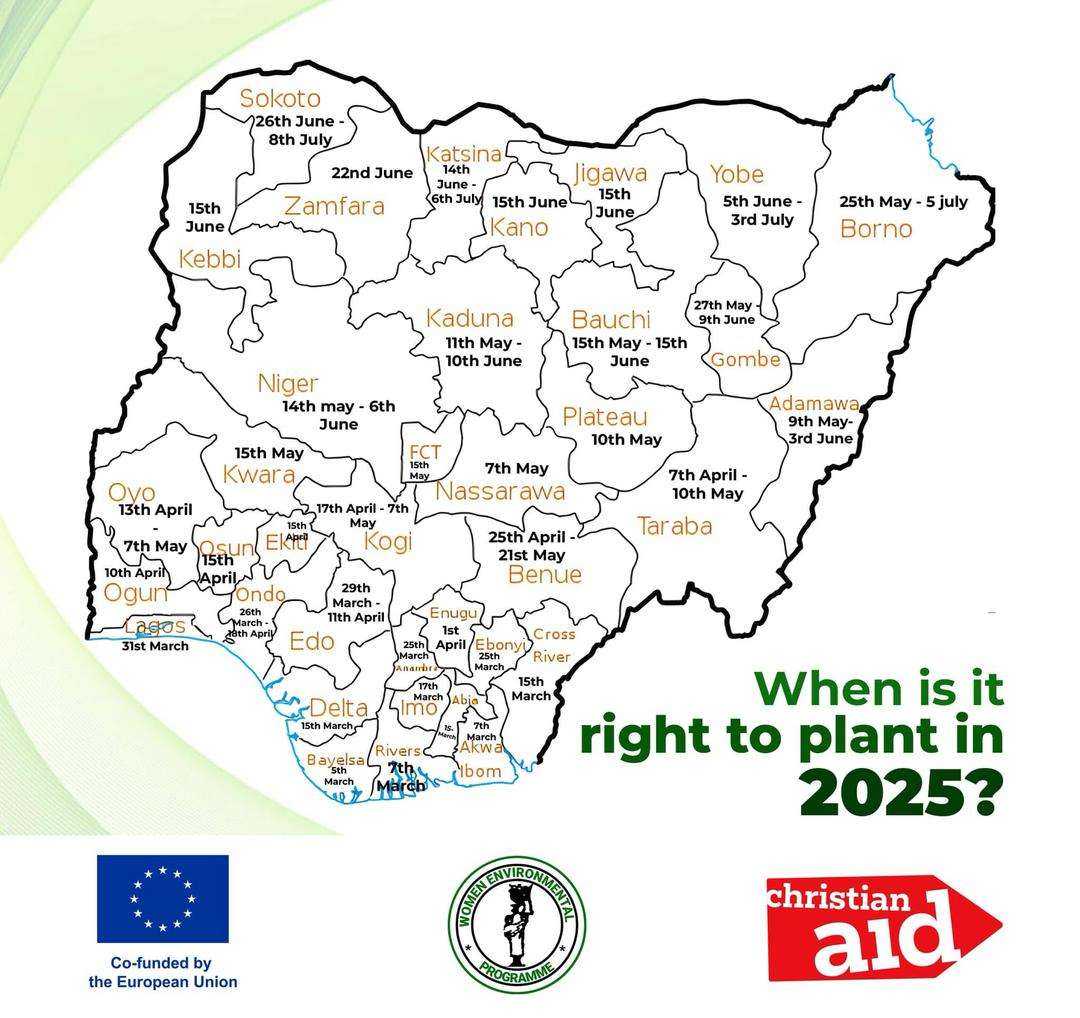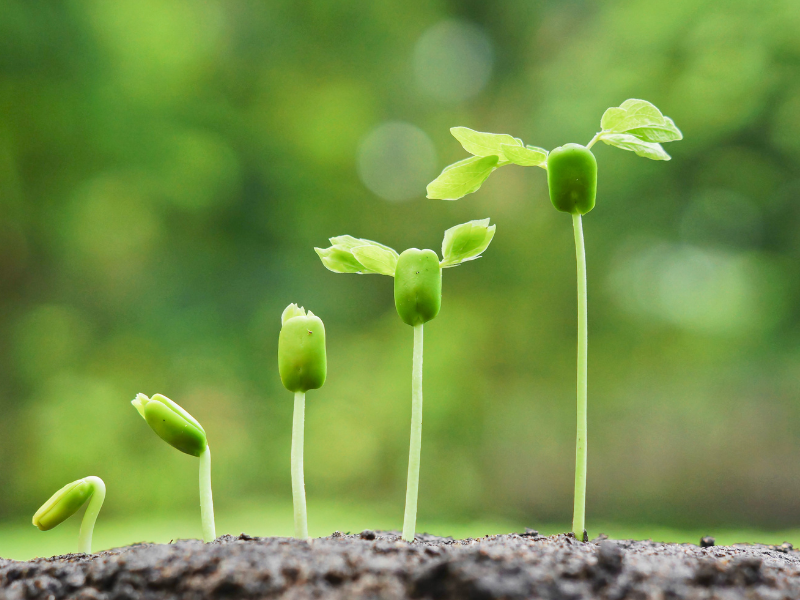
Introduction
For Nigerian farmers, knowing when is the best time to plant is crucial for achieving high yields and successful harvests. The timing of planting affects crop growth, yield, and overall farm productivity. This guide will help you determine the best planting times for your state, ensuring that you maximize your farm’s potential.
Factors Influencing the Best Time to Plant in Nigeria
Before diving into state-specific planting schedules, let’s explore the major factors that determine when to start planting:
Rainfall Patterns – Most crops depend on rainfall, making the onset of the rainy season an important factor.
Soil Moisture – Seeds need sufficient soil moisture to germinate properly.
Temperature – The right temperature ensures proper crop growth and minimizes the risk of pests and diseases.
Crop Type – Different crops have different planting windows, so farmers must plan accordingly.
When Do Farmers Plant Crops in Nigeria?
The time farmers plant their crops varies across regions due to climate differences. Typically, the planting season in Nigeria aligns with the start of the rainy season, ensuring that crops receive adequate moisture for proper growth.

Best Time to Plant in Each Nigerian State
Based on rainfall patterns and climate data, the ideal planting periods for Nigerian states are as follows:
Northern Nigeria (Drier Climate, Later Rainfall)
Sokoto – 26th June – 8th July
Zamfara – 15th June
Kebbi – 15th June
Katsina – 14th June – 6th July
Kano – 15th June
Jigawa – 15th June
Yobe – 5th June – 3rd July
Borno – 25th May – 5th July
Gombe – 27th May – 10th June
Bauchi – 15th May – 15th June
Adamawa – 9th May – 3rd June
Kaduna – 11th May – 10th June
North-Central Nigeria (Moderate Rainfall, Mid-Year Planting)
Niger – 14th May – 6th June
Kogi – 29th March
Benue – 25th April – 21st May
Nassarawa – 7th May
FCT (Abuja) – 7th May
Plateau – 10th May
Taraba – 7th April – 10th May
Southwest Nigeria (Early Rainfall, Earlier Planting)
Lagos – 31st March
Ogun – 26th March
Osun – 1st April
Oyo – 7th April – 10th April
Ondo – 15th April
Ekiti – 15th April
Kwara – 15th May
Southeast Nigeria (High Rainfall, Early Planting)
Enugu – 1st April
Ebonyi – 25th March
Cross River – 7th March
Rivers – 7th March
Delta – 7th March
Bayelsa – 7th March
Akwa Ibom – 7th March

When is Planting Season for Farmers?
The planting season in Nigeria varies depending on region and crop type.
In Southern Nigeria, planting starts as early as March, especially for crops like maize, cassava, and yams.
In the North, planting typically begins in May or June, as farmers wait for the onset of the rainy season.
Some crops, like rice, may have multiple planting seasons, depending on irrigation availability.
Best Time to Plant Seeds for Maximum Yield
For optimal crop production, planting seeds at the right time ensures proper germination and growth. Farmers should consider the following factors:
Early planting (before the rains become excessive) helps crops establish strong roots.
Delayed planting may expose crops to pests and drought stress.
Crop rotation can also affect when and how seeds are planted to maintain soil fertility.
Why You Should Follow the Right Planting Schedule
Planting at the right time ensures:
Better Germination – Seeds sprout properly when planted at the right time.
Higher Yields – Crops grow well when they get the right amount of rain and sunlight.
Reduced Pest and Disease Risks – Planting at the right time helps avoid peak pest seasons.
Efficient Use of Farm Inputs – Fertilizers and pesticides work better when applied at the right growth stages.
While timing is essential, knowing how planting seasons align with your crop type and region is equally important. Dive deeper into our complete planting season breakdown for that.

HTSFarms.ng – Your Ultimate Farming Partner
At HTSFarms.ng, we provide Nigerian farmers with expert guidance, farm inputs, and real-time planting updates to ensure they plant at the right time. Here’s how we support farmers:
Accurate Weather Forecasts – Know the best time to plant based on your location.
High-Quality Seeds – Get seeds that match your state’s climate for better yields.
Agricultural Equipment – Access modern tools to improve your farming efficiency.
Expert Advice – Receive tailored farming advice to maximize your harvest.
Conclusion
When is the best time to plant? The answer depends on your location and the crops you plan to grow. Following the state-specific planting times outlined in this guide will help you achieve a bountiful harvest. At HTSFarms.ng, we are committed to supporting farmers with the right tools, seeds, and knowledge to ensure successful farming seasons.
Start your planting season the right way! Visit HTSFarms.ng today for expert guidance and farm supplies.
FAQ
The best month depends on your location, but most regions begin planting at the start of the rainy season, usually around March to May.
Yes, it varies. Northern states tend to plant earlier due to their shorter rainy seasons, while southern states start a bit later with extended rainfall.
Rainfall determines soil moisture, which is essential for seed germination. Farmers typically wait for steady rains before planting to ensure proper root development.
Yes, but only if you have access to irrigation. Dry season farming is growing in popularity, especially for vegetables and short-cycle crops.
Crops like maize, rice, cassava, millet, groundnut, and yam thrive during the main rainy season planting period.





